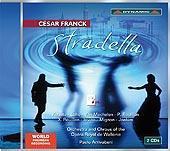|
Back
09/21/2014
César Franck: Stradella
Marc Laho (Stradella), Isabelle Kabatu (Léonor), Werner Van Mechelen (Spadoni), Philippe Rouillon (The Duke), Xavier Rouillon (Pietro), Giovanni Iovino (Michael), Patrick Mignon (Beppo), Roger Joakim (An Officer), Orchestra and Chorus of the Royal Opera de Wallonie, Marcel Seminara (chorus master), Paolo Arrivabeni (conductor)
Recording: L’Opéra de Liège, Belgium (September 2012)
Dynamic CDS7692 (2 CDs) – 105’
Notes in English; libretto in French and English at www.dynamic.it

   
César Franck composed his opera Stradella in 1841 at the age of 19 while still a student at the Paris Conservatoire. He used a libretto by Emile Deschamps and Emilien Pacini whose picaresque concoction had been used for an unsuccessful production at the Paris Opera by Louis Niedermeyer in 1837. The plot treats an incident in the life of composer Alessandro Stradella (1639-1682). In the opera he is in Venice, employed by one Duke Pesaro, and both he and the Duke are in love with Léonor, one of Stradella’s students. She and Stradella plan their elopement when the duke’s lieutenant, Spadoni, arrives to kidnap her. She is locked away but Stradella frees her and they flee to Rome. The duke then hires two assassins, Pietro and Michael, to kill Stradella, but upon hearing his beautiful music they decide they cannot murder him and contemptuously return the duke’s blood money.
Franck fully composed the work but never orchestrated it, leaving it in a two-piano arrangement. It sat in France’s Bibliothèque Nationale until its premiere production at the Opéra Comique in 1985 where I saw it. I felt the work was viable without being an earth-shaking discovery. The two-piano accompaniment worked just fine in the intimate space of the Salle Favart. This recording is of a live performance in Liège (Franck’s birthplace) for which Luc Van Hove orchestrated the score. His treatment follows the tuneful idiom of the age very adroitly. Perhaps he was influenced by the style of a success of the day, Adolph Adam’s Le Postillon de Longjumeau (premiered in 1836).
There is some very decent singing on this recording. Marc Laho displays attractive youthful ardour in the title role, and Isabelle Kabatu has just the right lyrical voice for Léonor. Baritone Philippe Rouillon (the duke) and bass-baritone Werner Van Mechelen (Spadoni) display fine and appropriate voices in their roles. (The piece should not be difficult to cast as it does not demand anything extreme or pyrotechnical; it would be a natural for conservatories.) The chorus work however, is unimpressive, what with an unfocussed male chorus and a wavering children’s group. One must consider that this is a live recording of a performance (the DVD review on this website describes a lot of water on stage), but still one wishes for more incisive conducting, such as in the complicated abduction scene where the group of kidnappers posing as carnival revelers come upon a police patrol plus Stradella conducting a group of children. (The scene foreshadows the abduction scene in Verdi’s Rigoletto, composed ten years later - not that Verdi would have known Stradella.)
While Luc Van Hove’s orchestration avoids being accused of having done damage to the work, not so that of the director Jaco Van Dormael, who I assume is the person who has seen fit to change the ending by having Stradella killed and then the guilty duke voicing remorse. It is true that the historical Alessandro Stradella was eventually murdered on orders of a nobleman, but that came later in life (dalliance with forbidden women seems to have become a habit.) Many think that a tragic ending gives more weight to a work, but Stradella was designed by Franck and his librettists as a diverting comedy. Beside this, when one downloads the libretto (available in French and English) from the label’s website (www.dynamic.it), what one gets is the original comic ending without the tragic twist.
While this recording is useful in getting acquainted with a work that deserves to come out of obscurity, Stradella still awaits the recording it deserves.
Michael Johnson
|